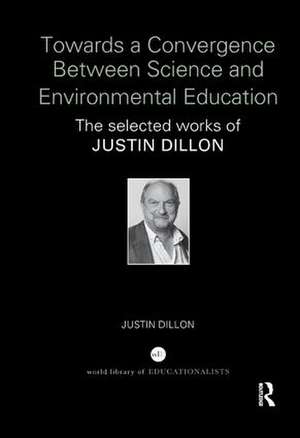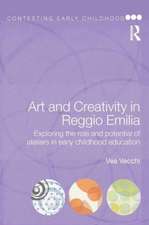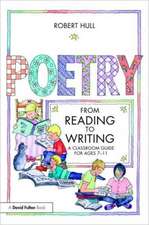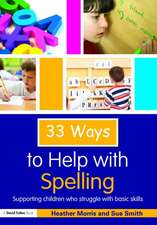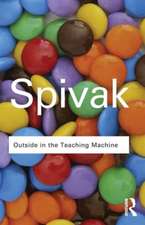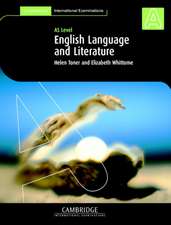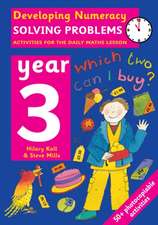Towards a Convergence Between Science and Environmental Education: The selected works of Justin Dillon: World Library of Educationalists
Autor Justin Dillonen Limba Engleză Paperback – 15 apr 2019
Internationally recognized for his research on environmental education, science engagement, learning outside the classroom, and teacher identity and development, in this volume Justin Dillon brings together a thoughtfully crafted selection of his writing representing key aspects of his life and work leading to his current thinking on the need for a convergence of science and environmental education. The chapters are organized around 7 themes: On Habitus; On methodological issues; Developing theories of learning, identity and culture; Challenges and opportunities—science, the environment and the outdoors; Classroom issues—the emergence of Science|Environment|Health; Science engagement and communication; Science, environment and sustainability.
| Toate formatele și edițiile | Preț | Express |
|---|---|---|
| Paperback (1) | 390.37 lei 6-8 săpt. | |
| Taylor & Francis – 15 apr 2019 | 390.37 lei 6-8 săpt. | |
| Hardback (1) | 1225.22 lei 6-8 săpt. | |
| Taylor & Francis – 7 oct 2016 | 1225.22 lei 6-8 săpt. |
Din seria World Library of Educationalists
-
 Preț: 323.15 lei
Preț: 323.15 lei -
 Preț: 291.42 lei
Preț: 291.42 lei -
 Preț: 318.54 lei
Preț: 318.54 lei -
 Preț: 339.38 lei
Preț: 339.38 lei -
 Preț: 390.54 lei
Preț: 390.54 lei -
 Preț: 333.90 lei
Preț: 333.90 lei -
 Preț: 306.31 lei
Preț: 306.31 lei - 18%
 Preț: 1053.47 lei
Preț: 1053.47 lei -
 Preț: 475.27 lei
Preț: 475.27 lei -
 Preț: 480.46 lei
Preț: 480.46 lei - 18%
 Preț: 1000.27 lei
Preț: 1000.27 lei - 18%
 Preț: 1059.48 lei
Preț: 1059.48 lei -
 Preț: 397.88 lei
Preț: 397.88 lei - 18%
 Preț: 1058.69 lei
Preț: 1058.69 lei - 16%
 Preț: 242.50 lei
Preț: 242.50 lei - 18%
 Preț: 1166.01 lei
Preț: 1166.01 lei - 25%
 Preț: 851.46 lei
Preț: 851.46 lei -
 Preț: 404.67 lei
Preț: 404.67 lei - 13%
 Preț: 303.61 lei
Preț: 303.61 lei -
 Preț: 482.35 lei
Preț: 482.35 lei - 26%
 Preț: 847.31 lei
Preț: 847.31 lei - 18%
 Preț: 1000.27 lei
Preț: 1000.27 lei -
 Preț: 441.54 lei
Preț: 441.54 lei - 18%
 Preț: 1171.89 lei
Preț: 1171.89 lei - 18%
 Preț: 1325.75 lei
Preț: 1325.75 lei -
 Preț: 438.65 lei
Preț: 438.65 lei -
 Preț: 402.98 lei
Preț: 402.98 lei - 18%
 Preț: 1275.71 lei
Preț: 1275.71 lei - 18%
 Preț: 1225.22 lei
Preț: 1225.22 lei - 22%
 Preț: 294.60 lei
Preț: 294.60 lei - 28%
 Preț: 822.54 lei
Preț: 822.54 lei - 18%
 Preț: 1166.01 lei
Preț: 1166.01 lei -
 Preț: 478.41 lei
Preț: 478.41 lei - 26%
 Preț: 765.01 lei
Preț: 765.01 lei - 18%
 Preț: 1222.36 lei
Preț: 1222.36 lei -
 Preț: 441.96 lei
Preț: 441.96 lei - 18%
 Preț: 1060.87 lei
Preț: 1060.87 lei - 28%
 Preț: 820.32 lei
Preț: 820.32 lei - 15%
 Preț: 444.50 lei
Preț: 444.50 lei - 26%
 Preț: 822.36 lei
Preț: 822.36 lei
Preț: 390.37 lei
Nou
Puncte Express: 586
Preț estimativ în valută:
74.71€ • 77.71$ • 61.67£
74.71€ • 77.71$ • 61.67£
Carte tipărită la comandă
Livrare economică 12-26 aprilie
Preluare comenzi: 021 569.72.76
Specificații
ISBN-13: 9781138345324
ISBN-10: 1138345326
Pagini: 380
Ilustrații: 7
Dimensiuni: 152 x 229 x 20 mm
Greutate: 0.48 kg
Ediția:1
Editura: Taylor & Francis
Colecția Routledge
Seria World Library of Educationalists
Locul publicării:Oxford, United Kingdom
ISBN-10: 1138345326
Pagini: 380
Ilustrații: 7
Dimensiuni: 152 x 229 x 20 mm
Greutate: 0.48 kg
Ediția:1
Editura: Taylor & Francis
Colecția Routledge
Seria World Library of Educationalists
Locul publicării:Oxford, United Kingdom
Cuprins
Contents
Preface
Introduction
Section 1: On Habitus
Preface
Introduction
Section 1: On Habitus
- Dillon, J. (2007). An organic intellectual? On science, education, and the environment. In, K. Tobin and W.-M. Roth (eds), The Culture of Science Education. Its History in Person. Rotterdam: Sense Publishers, pp. 311–322.
- Dillon, J. (2002). Managing teacher development: the changing role of the Head of Department in England. In, P. Fraser-Abder (ed.), Professional Development in Science Teacher Education: Local Insights with Lessons for the Global Community, Taylor and Francis, pp. 172–186.
- Meyers, R.B., Brody, M., Dillon, J., Hart, P., Krasny, M., Monroe, M., Russell, C., & Wals, A. (2007). Towards creating an inclusive community of researchers: the first three years of the North American Association for Environmental Education research symposium. Environmental Education Research, 13(5), 639–661.
- Clark, C., Brody, M., Dillon, J., Hart, P., & Heimlich, J. (2007). The messy process of research: dilemmas, process, and critique. Canadian Journal of Environmental Education, 12, 110–126.
- Bevan, B., & Dillon, J. (2010). Broadening views of learning: developing educators for the 21st Century through an international research partnership at the Exploratorium and King’s College London. The New Educator, 6, 167–180.Section 2: On methodological issues
- Dillon, J. and Wals, A. (2006). On the dangers of blurring methods, methodologies and ideologies in environmental education research. Environmental Education Research, 12(3/4), 549–558.
- Dillon, J., & Reid, A. (2004). Issues in case study methodology in investigating environmental and sustainability issues in higher education: towards a problem-based approach? Environmental Education Research, 10(1), 23–37.Section 3: Developing theories of learning, identity and culture
- Dillon, J., Kelsey, E., & Duque-Aristizábal, A. M. (1999). Identity and culture: theorising emergent environmentalism. Environmental Education Research, 5(4), 395–405.
- Dillon, J., & Teamey, K. (2002). Reconceptualising environmental education – taking account of reality. Canadian Journal of Science, Mathematics and Technology Education, 2(4), 467–483.
- Dillon, J. (2003). On learners and learning in environmental education: Missing theories, Ignored communities. Environmental Education Research, 9(2), 215–226.Section 4: Challenges and opportunities - science, the environment and the outdoors
- Dillon, J., Rickinson, M., Teamey, K., Morris, M., Choi, M. Y., Sanders, D., & Benefield, P. (2006). The value of outdoor learning: evidence from research in the UK and elsewhere. School Science Review, 87(320), 107–111.
- Dillon, J., Rickinson, M., Sanders, D., & Teamey, K. (2005). On food, farming and land management - towards a research agenda to reconnect urban and rural lives. International Journal of Science Education. 27(11), 1359–1374.
- Dillon, J. and Reid, A. (2007). Science, the environment and citizenship: teaching values at Minstead Study Centre. In, D. Corrigan, J. Dillon, & R. Gunstone (eds), The Re-emergence of Values in the Science Curriculum. Rotterdam: Sense Publishers, pp. 77–88.
- Dillon, J. (2013). Barriers and benefits to learning in natural environments: towards a reconceptualisation of the possibilities for change. COSMOS 8(2), 1–14.Section 5: Classroom issues - the emergence of Science|Environment|Health
- Dillon, J., & Gill, P. (2001). Risk, environment and health: aspects of policy and practice. School Science Review, 83(303), 65–73.
- Dillon, J. (2009). Approaching ‘soft disasters’ in the classroom: teaching about controversial issues in science, technology, society, and environment education. In, A. Jones, & M. de Vries (eds), International Handbook of Research and Development in Technology Education. Rotterdam: Sense, pp. 297–306.
- Dillon, J. (2009). On scientific literacy and curriculum reform. International Journal of Environmental and Science Education, 4(3), 201–213.
- Dillon, J. (2012). Science, environment and health education: towards a reconceptualisation of their mutual interdependences. In, A. Zeyer, & R. Kyburz-Graber (eds), Science|Environment|Health - towards a renewed pedagogy for science education. Dordrecht: Springer, pp. 87-101.Section 6: Science engagement and communication
- Dillon, J. (2011). Science communication – a UK perspective. International Journal of Science Education, Part B: Communication and Public Engagement, 1(10), 5–8.
- Kelsey, E. and Dillon, J. (2010). "If the public knew better, they would act better": Challenging the myth of the ignorant public. In, R. Stevenson, & J. Dillon (eds), Engaging Environmental Education: Learning, Culture and Agency. Rotterdam: Sense, pp. 99–110.
- Dillon, J., & Hobson, M. (2012). Communicating global climate change: issues and dilemmas. In, J. Gilbert, B. Lewenstein, & S. Stocklmayer (eds), Communication for Engagement in Science and Technology. New York: Routledge, pp. 215–228.Section 7: Science, Environment and sustainability
The final section sets out my position on the relationship between science, the environment and sustainability. #22 is a critique of simplistic thinking about the relationship between science and environmental education. #23 is a critique of education for sustainable development. #24 lays out my current thinking on the need for a convergence of science and environmental education. - Dillon, J. (2005). ‘Silent Spring’: Science, the environment and society. School Science Review, 86(316), 113–118.
- Dillon, J., & Huang, J. (2010). Education for sustainable development: Opportunity or threat? School Science Review, 92(338), 39–44.
- Wals, A.E.J, Brody, M., Dillon, J, & Stevenson, R.B. (2014). Convergence between science and environmental education. Science, 344, 583-4.
Notă biografică
Justin Dillon is Professor of Science and Environmental Education and Head of School, University of Bristol Graduate School of Education, UK. After taking a degree in chemistry from Birmingham University, he trained as a teacher at Chelsea College and went on to teach in six secondary schools in London. His research originally focused on teaching and learning about chemistry in England and Spain. More recently he has focused on science learning outside the classroom, particularly in museums, science centres and botanic gardens in the UK, Europe and elsewhere. Together with two colleagues at King’s College London, he co-ordinated the ESRC's Targeted Initiative on Science and Mathematics Education (TISME) and he was a member of the highly influential ASPIRES project. Dillon served as elected President of the European Science Education Research Association from 2007 to 2011. He co-edits the International Journal of Science Education, is a trustee of the Council for Learning Outside the Classroom, was Chair of the London Wildlife Trust for many years, and has co-edited a number of books including the International Handbook of Research on Environmental Education. He was given ‘The Outstanding Contributions to Research in Environmental Education Award’ by the North American Association for Environmental Education in 2013.
Descriere
In this volume, Justin Dillon— internationally recognized for his research on environmental education, science engagement, learning outside the classroom, and teacher identity and development—brings together a thoughtfully crafted selection of his major writings.
